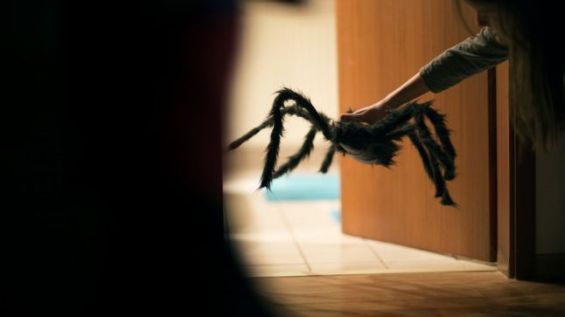In a 23 minute-long video, Khalid managed to fool his father into thinking that their house was robbed. When he got home, he shockingly noticed that most of his furniture has gone. The TV, the sofa and many of his belongings that were displayed in a small living room. Scared, confused and mostly distressed, the father ran around the house before moving to the room where the camera was hidden to shout at his son, hit him and blame what had happened on his recklessness.
It took Khalid a few minutes and a couple of hidden giggles before revealing to his father that it was all a joke and that this was a prank for his almost 850,000 subscribers. Relieved, but in a bad way, the father started cursing and shouting, telling his son that he was almost going to faint, citing high blood pressure and diabetes.
Khalid’s video, although it was a bad experience for his aging father, made it to the internet, making almost 1 million views. Ali was luckier when it comes to views. His video received 1.3 million views, all for making his sister think that he was killed.
When she entered the house, she panicked seeing her brother laying on the floor, with blood all over and a knife next to his seemingly lifeless body. The result was a good minute of crying, shouting and just panicking. The sister almost lost her mind thinking that her brother was murdered. And even when he told her that it was a prank, she couldn’t stop crying and had a panic attack that forced him to put an end to the video.
A never-ending spiral
Khalid and Ali’s pranks are just two of the many prank videos that the YouTube Moroccan community is posting these days. Few of them end well, with giggles and laughs, while most of them have shocking and violent reactions as well as emotionally and physically harmful endings.
Watching these videos, however, is hard to enjoy, when thinking of the danger and recklessness that surround them. So why produce them in the first place?
To Moroccan social media expert Marouane Harmache, the answer to this question can be summed up in three words «money, fame and boredom». He believes that most of these «incautious» pranks that can sometimes be «harmful» are posted on social media in an attempt to «earn some YouTube money, become famous and spend time».
«These three reasons push some YouTubers and vloggers to fall for this never-ending ‘spiral’, producing content that may be harmful and heedless», Harmache explained. This competition even makes Moroccan content creators rush into making the «craziest prank videos» no matter the consequences.
And as surprising as it may seem these consequences can hurt both the pranksters and their victims. According to the social media expert, these YouTubers violate their own privacy when «revealing their identities and the ones of their families, their lifestyle and daily activities». «They mainly forget that what is posted to the internet remains there forever», he argued.
Recklessness for subscribers
However, this crazy urge of posting «reckless» pranks on the internet can also be looked at from a different angle. To Moroccan psychosociologist Mohcine Benzakour, in addition to the need of gaining fame and going viral, YouTubers in Morocco publish said videos because they are «out of control». And it is all related to the nature of the internet and the freedom it gives its users.
«In the past, with TV and radio, we had bodies that controlled the content produced and broadcast, but now with the internet it is hard to do that», Benzakour explained. «On social media platforms, we see things that comply with the ethics and mentality of the content creator and their followers through their shares and likes», he argued.
While producing these videos, the «physical, mental and emotional health of people is completely ignored and disregarded», said Benzakour, adding that what is glorified on the other hand is «the likes, shares and subscriptions, in other words, the money».
To the professor these factors explain why we see «teenagers with cameras putting their lives and lives of their loved ones in jeopardy» to create prank and challenges videos.
But this vicious circle does not end there. To the psychosociologist, many of these videos contain violent reactions, with aggressive parents, wives and husbands angered by these pranks or painful ones, where the victims of the pranks are distressed and emotionally hurt. «It shows how people can enjoy the misery and pain of others», Benzakour pointed out.
The power of the internet
Moroccan sociologist Fouad Belmir blames this trend on education and the rapid change our society is facing with the emergence of new technologies and platforms. «This speedy change did not give Moroccans the time to slowly digest the power of the internet», he signaled.
Belmir believes that «the habits and practices that came with the internet and smartphones took us by a rush and instead of thinking wisely before using these devices we end up sharing whatever comes in hand».
«When these boundaries are crossed and these people see the consequences of their doing, they realize that it was wrong in the first place to act in a reckless way», Belmir said.
To him, parents must think twice before handing their children smartphones and tablets. «Although we think that they are safe and sound inside their rooms, they are browsing the internet and end up being exposed to contents that could influence them in a negative way», he concluded.





 chargement...
chargement...












